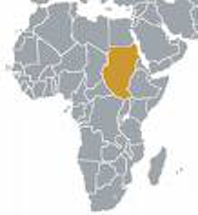Sudan: Khartoum regime fires bullets and tear gas into hospital during protests

Lord Alton is calling on the UK to warn the Khartoum regime that Britain cannot continue with 'business as usual' while it crushes peaceful protests with disproportionate violence. Protests about the East African country's deteriorating economy started four weeks ago, quickly spreading across the country. The marchers say the government is repressive, corrupt, racist and undemocratic.
According to Lord Alton: "Now, having cosied up to the UK, this regime, led by a man indicted for genocide and crimes against humanity, is once more using unspeakable violence against his own people. The UK signally and lamentably fails to speak out in support of protestors seeking change, and is muted in denouncing the regime's attacks on innocent people."
Lord Alton, who visited Darfur at the height of the regime-sponsored killing in 2004, cites recent attacks on unarmed civilians. Human Rights Watch has verified the credibility of video of Sudanese security services pursuing injured protesters into hospitals, and firing bullets and tear gas at patients and medical staff. In addition, Russian mercenaries have been filmed on the streets, supporting the Khartoum regime.
Amnesty believes more than 40 unarmed civilians have been killed, and hundreds have been arrested. Lawyers, journalists, doctors, teachers and students are among the protesters thought to be at risk of torture at the hands of the National Intelligence and Security Services. For years, both Amnesty and Human Rights Watch have documented the systematic abuse of people who have been detained in Sudan.
President Omar Bashir has been in power since an Islamist coup in 1989. His power base is among the security services and the ethnic groups in Khartoum and along the Nile. Christians, black Africans and people living in the periphery have complained of marginalization for decades. Sudan watchers says that minorities have been ruthlessly targeted by the regime, trying to impose an Arab and Muslim identity on the diverse nation. Bashir was indicted for genocide in Darfur by the International Criminal Court.
Although the uprising has spread, it is thought that President Bashir may have thwarted a coup attempt from within his regime's ranks. He has cautiously divided security service activities between the National Intelligence and Security Services, the army, the Rapid Support Forces (the former Janjaweed militia responsible for ethnic cleansing in Darfur) and the police. He also benefits from the lack of unity among opposition forces.
Moreover, the regime receives support from Egypt and the Gulf Arab states. Sudan has 10,000 troops fighting alongside Saudi Arabia in Yemen, and Riyadh has contributed $2.2 billion to shore up Khartoum's short-term financial viability. However, the country has debts of over $40 billion, partly due to a shortfall on oil revenue following the secession of South Sudan. One cause of popular discontent has been the proportion of the national budget that is spent on security, with comparatively little going to education, health or infrastructure spending in peripheral areas of the country.
Many Sudan commentators are surprised that President Salva Kiir of South Sudan has pledged his support for Bashir. Kiir was a rebel leader during the decades-long uprising of black African southern Sudanese against Bashir during which an estimated two million died.
Despite Bashir's indictment for genocide, there has been a thaw in its relations with the US and Europe. The UK government has encouraged business links with Khartoum, and in 2016 the United States dropped some sanctions, citing its close cooperation with Khartoum on terrorism. The CIA is known to have a significant presence in Sudan. In addition, in 2015 the European Union negotiated the so-called Khartoum Process by which it pays Sudan to prevent would-be migrants reaching the Mediterranean. Refugee rights activists argue that the Khartoum regime's repressive and corrupt rule has been a significant factor in prompting thousands of people to try to leave Sudan.
According to Lord Alton: "In addition to promoting "business as usual" with Sudan, the United Kingdom has co-opted the Khartoum regime to police the flow of migrants from the region. It's like asking the burglar to keep an eye out for burglars. The watchdog and the robber have become one and the same thing." He continued, "The regime's violent genocidal policies have been a major cause of the exodus of desperate people."
Observers says the Khartoum regime has tried to rally its citizens against the protests by appealing to long-standing ethnic divisions in Sudanese society, and blaming black African and Christian groups. However, efforts to stoke racial tension have backfired, with ethnically Arab demonstrators chanting, "We are all Darfur now." Sudan watchers point out that the regime may sacrifice President Bashir to appease popular opinion, while allowing the same repressive Islamist system to survive under a new figurehead.
The UK has responded to the current violence in a joint statement with Canada, Norway and the USA. Those who have followed Britain's growing closeness to Khartoum note the UK is taking a more critical approach to the regime's response to protests. The EU also indicated that Khartoum's actions would impact Europe's engagement with Sudan.
Reacting to the statement, Maddy Crowther of the human rights group Waging Peace, said, "We are pleased the UK, along with its international partners, is clear that Sudan's behaviour during the current protests will affect the terms of our future engagement. It is welcome indication that they may reverse their policy of normalisation. They should now push for investigations into the deaths of protestors, reconsidering existing security sector cooperation, and refusing to back President Bashir's plan to run again in the 2020 general election. This clear expression of the people's will should mark a turning point in UK-Sudan relations. There can be no more 'business as usual'."


















